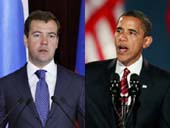Experts await Obama-Medvedev meeting
By Temuri Kiguradze
Tuesday, February 24

Four Georgian experts conducted a briefing at the Tbilisi RIA-Novosti Press Centre, discussing the results of the fourth round of Geneva peace talks on February 23. “At the Geneva talks the sides didn’t even agree on the date of the next talks. This shows that Russia expects the results of the Medvedev-Obama meeting to define its future actions,” stated independent political expert Soso Tsiskarishvili. He stated that these internationally mediated negotiations, which are dedicated to finding ways to start a dialogue between the conflict sides, will have no meaning until Russia gets a message from the USA. “Neither Georgia, nor South Ossetia or Abkhazia were against the solving of the conflict, the only state that was satisfied with the frozen situation was Russia. It will not now change its policy until forced by the USA,” said Tsiskarishvili.
Another political expert, Irakli Sesiashvili, slammed the results of the Geneva talks, specifically the agreement on the creation of a mechanism for the prevention and investigation of incidents. He maintained that this agreement was adopted just to show that Russia is prepared to adopt a constructive position. “This is a situation when word “agreement” was acceptable to everybody, regardless of the substance of the agreement,” he said. The expert considered that this compromise doesn’t really mean a lot and that Russia can take a step back from it any time it wishes to.
“Russia will strike Georgia in whatever way it wants if the talks [between the US and Russian Presidents] go wrong,” stated Ramaz Sakvarelidze, another independent political expert. “The Geneva [talks] were just relaxation; they [the Russians] drew back but didn’t burn their bridges behind them. It [the agreement in Geneva] was not a signal for Georgia but for the USA.”
Tornike Sharashenidze, Coordinator of the Russian-Georgian Conflict Studies Centre, was more optimistic about the Geneva negotiation results. “At least we’ve got a mechanism that can help us prevent provocations, and what’s more important, it will be the basis for periodical meetings between the Georgian side and the separatist authorities,” Sharashenidze said. However he shared the general expert viewpoint concerning the April Obama-Medvedev meeting. “Georgia is not an equal partner of Russia and clearly not an equal opponent. I doubt the possibility of there being any serious dialogue between Russia and Georgia without pressure [on Russia] being applied by the US. Any step forward in Russian-Georgian relations will be result of an agreement between the great countries,” stated Sharashenidze.
Discussing the possibility of further military actions, the experts stated that this possibility is quite low, despite all the rumours and announcements to this effect. The experts stated that the status quo suits both the Russian and Georgian authorities as it can draw the attention of their populations away from internal problems to the “image of the enemy.” “Russia knows very well that another war in Georgia will not help it solve its economic crisis,” noted Soso Tsiskarishvili.
The anticipated meeting between Russian President Dmitry Medvedev and US leader Barrack Obama is expected to be held in London on April 2, during the G20 summit on the global economic crisis. “I believe that the discussion must be frank and honest and, I hope, it will be productive as well. The signals I have been receiving from the United States, from the Presidential Administration, and from the new President personally look encouraging. This is a sign our counterparts wish to work. We, too, hope for this very much,” said Medvedev commenting on the planned meeting.
The necessity of the meeting was also underlined by Russian Foreign Minister Sergey Lavrov, who stated that there are a “lot of things to discuss,” between the Presidents. “Medvedev and Obama have spoken on the phone twice, and this was not just an exchange of niceties but a discussion on the basic aspects of our relations. Both parties confirmed their position in favour of normalising relations, and as President Obama said, resetting them,” added Lavrov, as quoted by the Russian ITAR-TASS news agency.
